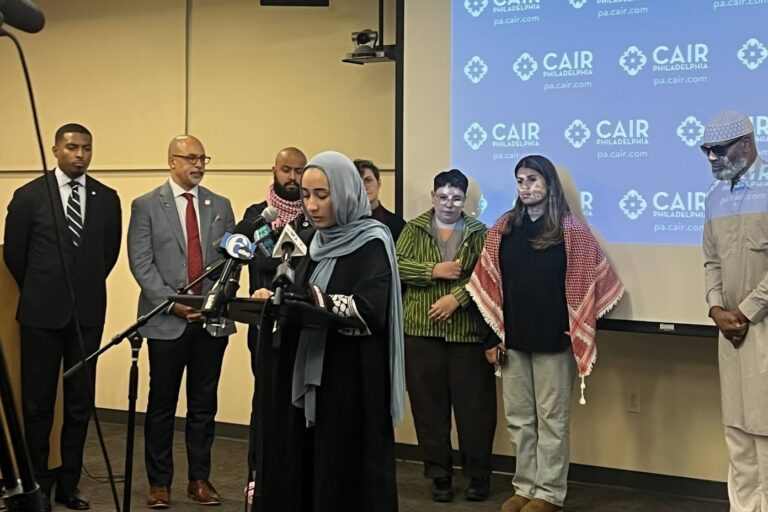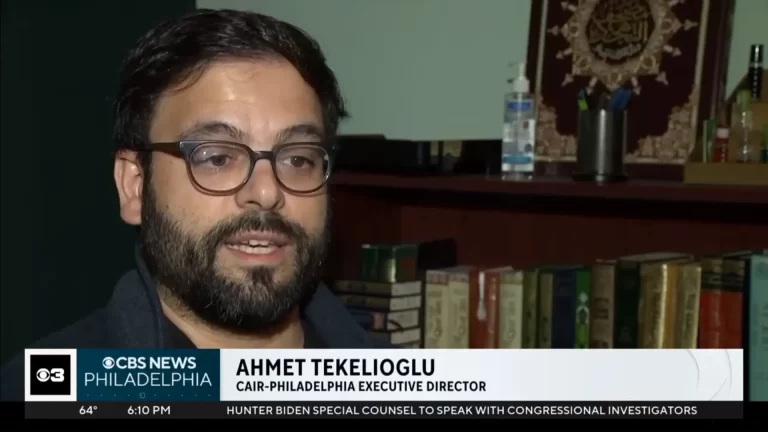Michelle Amoruso
Philadelphia Weekly Press, November 5, 2007

The Council for American-Islamic Relations (CAIR) sponsored a panel discussion on November 4, 2007, at the Hall of Flags in Houston Hall at the University of Pennsylvania. The panel was comprised of Dr. Parvez Ahmed, Dr. Larry Davidson, Dr. Arthur Waskow, and Dr. Linda Hanna. Lorraine Ballard Morrill, the Director of News and Communications Affairs at Clear Channel Radio Philadelphia, moderated the event.
Dr. Parvez Ahmed, current Chairman of the Board for CAIR and professor of finance at University of North Florida, opened the panel discussion by addressing the causes of Islamophobia. Ahmed suggested that “fear without reason,” fueled by government policies and media attention, is the root cause of Islamophobia. Ahmed stated that policies toward Muslims have been driven by paranoia rather than pragmatism and that mass media continue to focus on “the narrow band of extremists.” According to Ahmed, this has “unleashed a vicious cycle” in which fear and “bad policies” feed off and reinforce one another. Ahmed also stated that a lack of knowledge about Islam and the geographic isolation of Muslims contributes to Islamophobia.
Ahmed provided statistics from an opinion survey to illustrate his point (survey results available on CAIR’s website). He stated that “seven out of ten Americans believe that Islam has nothing to do with their faith,” suggesting a need to focus on establishing common ground in order to reduce fear and improve relations between faiths.
Ahmed suggested three ways to move forward. First, he called for “common sense intelligence gathering” which does not “criminalize a community.” Ahmed’s second suggestion was to promote military strategies without indiscriminate bombing. Finally, Ahmed stated the need to eliminate foreign occupation, and more importantly, to enable the emergence of democratic and civil society following this withdrawal.
Dr. Larry Davidson is a professor of history at West Chester University, and author of Islamic Fundamentalism and America’s Palestine. Davidson primarily focused on terrorist accusations made against numerous Muslim charities in the United States. He accused the Bush administration of acting out of political, not judicial, interests. Davidson highlighted three organizations, the Holy Land Foundation, the Global Relief Foundation, and the Benevolent International Foundation.
Davidson’s comments came just two weeks after a judge declared a mistrial in case against five members of the Holy Land Foundation. Shut down just weeks after 9/11, the largest Muslim charity in America found its assets frozen amidst accusations of funding overseas terrorist organizations.
Davidson suggested three reasons behind the Bush Administration’s actions against these organizations: 1) to shut down the flow of money from America to Palestine; 2) to intimidate Muslim Americans, making them afraid to start new charitable organizations; and 3) to “enhance fear of Muslim Americans among the general public,” linking Muslim leaders and organizations to terrorists.
Davidson stated that even when official charges never materialize, the damage has already been caused, linking charities to terrorism in the public imagination. According to Davidson, this helps to reinforce fear of Muslims while undermining the legitimacy of Islamic organizations. Davidson concluded by stating that the treatment of American Muslims and organizations is “a barometer for the entire legal and justice system.”
Dr. Arthur Waskow is a rabbi, leader within the Jewish renewal movement, and founder of the Shalom Center in Philadelphia. Waskow emphasized the importance of interfaith relationships and open communication, especially during times of political uncertainty. Waskow stated that building connections will help generate understanding and compassion instead of fear and violence. Waskow also discussed the role of the Jewish community, pointing out that Reform Jews, the largest sect of Judaism in America, do not tolerate Islamophobic stances. He also emphasized that Islamophobia is perpetuated by individuals from all sectors of society, and should never be associated with Judaism.
Dr. Linda Hanna spoke about stereotypes and Islam in the United States. Dr. Hanna noted the lack of differentiation between the ethnic category Arab and the religion of Islam. Hanna pointed out that twenty-five percent of Arab Americans are Muslim. Additionally, no more than twenty five percent of American Muslims are Arab. However, the terms Arab and Muslim continued to be used interchangeably, presenting the Islamic world as a monolithic entity.
Hanna also discussed the use of the veil in American culture to symbolize backwardness and inferiority. These representations of the oppressed female Muslim are used to justify the belief that Muslim women are in need of rescue. Hanna stated that Muslim feminists have been largely overlooked in America, despite the fact that “feminism has existed in the Muslim world since the late 1800’s.”
Throughout the dialogue, a common theme emerged, urging for terrorism to be disassociated from religion, specifically Islam. By deconstructing this notion, Ahmed suggested that both Islamophobia and Anti-Americanism will begin to decline. Ahmed emphasized that “there is nothing religious about suicide bombings or terrorism.” Instead, it is foreign military occupation that is “the enabler of terrorism.”





